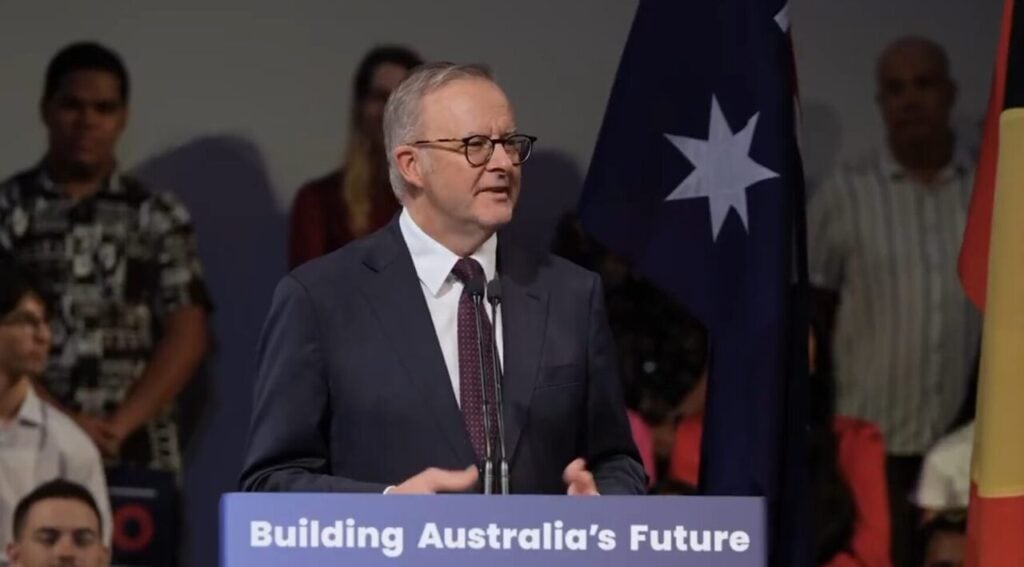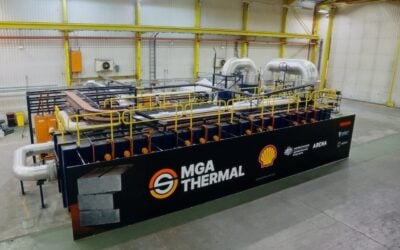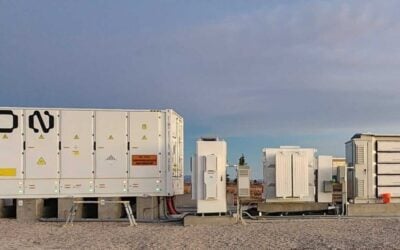
Anthony Albanese, Australia’s current Prime Minister and leader of the Australian Labor Party, has pledged to introduce an AU$2.3 billion (US$1.41 billion) battery subsidy scheme if re-elected. This scheme would reduce the upfront cost of home batteries by 30% via a rebate.
Albanese, who will face outspoken climate sceptic Peter Dutton’s Liberal-National Coalition in the upcoming election on 3 May, said the rebate scheme, which would be introduced from 1 July 2025, could save around AU$4,000 on a residential battery storage system.
The Cheaper Home Batteries Program would be offered via the existing Small-scale Renewable Energy Scheme. Small businesses and community facilities would also be able to access the subsidy, with support for up to 50kWh of batteries sized up to 100kWh eligible. Any batteries installed from 6 April to 1 July would be eligible for the subsidy, depending on Labor’s re-election, as long as they are not switched on.
Under the scheme, Labor predicts it could help Australia install around one million new home batteries by 2030.
Try Premium for just $1
- Full premium access for the first month at only $1
- Converts to an annual rate after 30 days unless cancelled
- Cancel anytime during the trial period
Premium Benefits
- Expert industry analysis and interviews
- Digital access to PV Tech Power journal
- Exclusive event discounts
Or get the full Premium subscription right away
Or continue reading this article for free
In a statement released by Albanese and Australia’s minister for climate change and energy, Chris Bowen, the two ministers emphasised the Labour Party’s support for renewables and cutting energy bills, highlighting their commitment to reducing energy bills by up to 90% if re-elected.
Central to this is accessibility to home batteries to complement the country’s rooftop solar uptake, which, as reported by our sister site PV Tech, recently surpassed the 25GW threshold. Despite this, home battery installations have staggered and not matched the rollout of rooftop PV.
“There have been four million rooftop solar installations across Australia. One in three Australian households now have solar – but only one in forty households have a battery. The battery will be installed at home and store power from solar panels for the household to use when needed,” a media statement read.
Other energy-related pledges the Labor Party have made include an additional AU$150 direct energy bill relief for households and small businesses from 1 July 2025, an AU$1 billion household energy upgrades fund, an AU$800 million social housing energy performance initiative, and an AU$100 million community energy upgrades fund.
Dutton attacks Labor’s plans: electricity prices ‘certain to go up’
In the latest war of words over energy policy, Peter Dutton responded to Labor’s proposed battery rebate scheme by insinuating that it’s confirmation that electricity prices are “certain to go up under a Labor government”.
“The point that I’d make is that AU$10,000 for a battery—maybe that’s the cost after this subsidy—I think you’re talking about higher-income families being in a position to pay for that. I just don’t know that the next-door neighbour who can’t afford to pay for that battery is going to subsidise the battery for me or for you on higher incomes,” Dutton said.
“What they’ve [Labor] been doing is pursuing this ideological renewables-only policy that’s driven up the cost of electricity. We are going to clean up this mess and help Australians have just affordability in their lives again.”
In contrast to Labor’s support of renewable energy, such as solar PV, the cheapest form of electricity generation, Dutton intends to focus more on oil and gas, coal-fired power, and nuclear reactors.
For nuclear power, this includes an AU$600 billion strategy that would controversially lift a ban on nuclear power that has been in place since 1983 via the Nuclear Activities (Prohibitions) Act. According to Labor, this could lead to an increase in energy bills by up to AU$1,200.
‘The most important development in consumer energy since subsidised solar’
The Australian renewable energy industry has widely welcomed the announcement of the proposed battery rebate scheme. It is seen as a conduit to reduce electricity bill costs and create virtual power plants within homes.
Trade association the Clean Energy Council’s general manager of distributed energy, Con Hristodoulidis, said the subsidy would help households overcome one of the biggest challenges with home batteries: their cost.
“The upfront cost of purchasing a battery averages around AU$14,000 and has been a barrier to entry for many homeowners who want to generate even further savings on their energy bills. Our data shows that less than 5% of households with rooftop solar panels currently invest in battery storage,” Hristodoulidis said.
“A national battery scheme will ensure more households will be empowered to turbocharge their energy independence and save on their bills. It’s good news for everybody’s wallets and the long-term future of Australia’s modern energy system – built on the cheapest form of renewable energy backed by storage.”
The Smart Energy Council’s chief executive, John Grimes, summarised the proposed subsidy scheme as a “battery bill buster programme.”
“The Cheaper Home Batteries Program is the most important development in consumer energy since Australians first gained access to subsidised solar panels,” Grimes added.
“Four million Australian homes have solar, and this policy will help them store that energy for later when it will be at its cheapest. Ten million Australians are already producing solar power; now they can store it.”
Western Australia introduces its own battery rebate scheme
At the end of last month, the Western Australian government announced its own residential battery subsidy scheme that would see 20,000 rebates of up to AU$5,000 for Synergy customers and up to AU$7,500 for Horizon Power customers offered from 1 July 2025.
The battery rebate will be available for up to 19,000 Synergy customers, offering AU$500 per kWh for a minimum of 5kWh battery capacity and a maximum of 10kWh. Additionally, up to 1,000 Horizon Power customers can qualify for rebates of AU$750 per kWh.
A similar number of no-interest loans of up to AU$10,000 will also be made available to assist lower—to middle-income households in participating in the scheme. The government confirmed that home business customers will also be eligible. The minimum loan amount will be AU$2,000.
The programme will be launched in multiple phases, starting on or before July 1, 2025. A qualified third-party service provider will manage it. The battery systems will need to demonstrate virtual power plant readiness and show that they can connect to the electricity grid, the South West Interconnected System (SWIS), and respond to signals.





